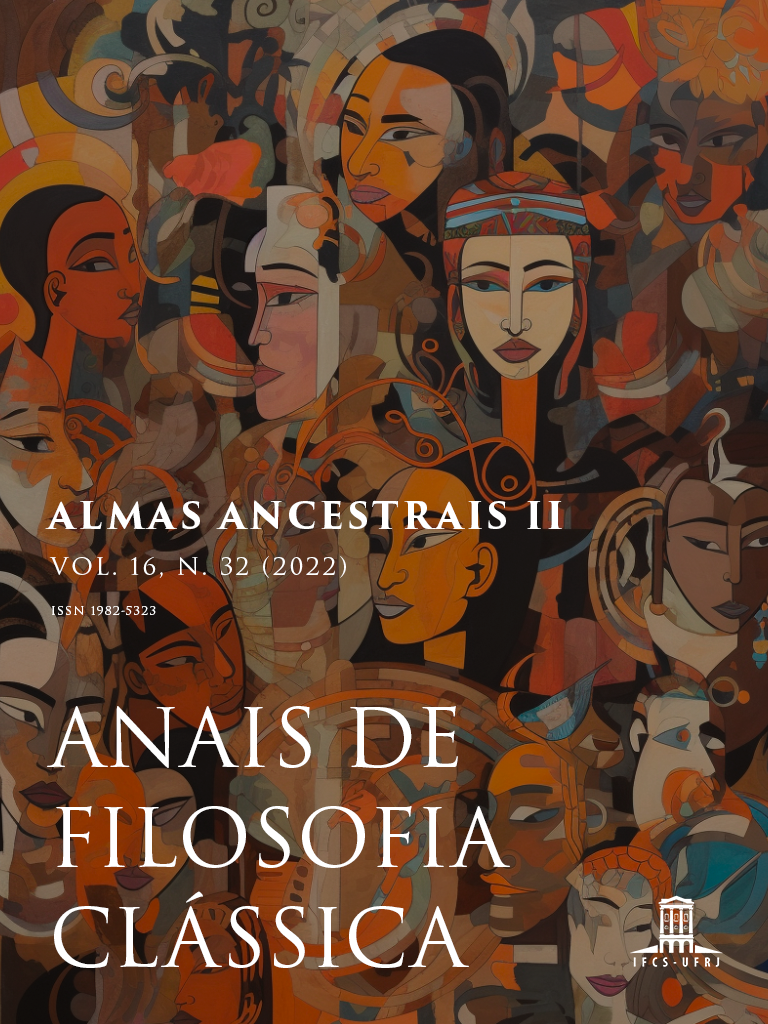Ammonio e Socrate: due maestri a confronto
Figure magistrali, maestri di filosofia e norme di educazione in Plutarco
DOI:
https://doi.org/10.47661/afcl.v16i32.56488Keywords:
Plutarch, Philosopher, true philosopher, dialogues, god-inspiredAbstract
Who is the true philosopher? How he acts in society and what kind of abilities he should hold? Comparing how Plutarch presents Socrates and Ammonius in his writings could help to understand Plutarch’s point of view. Socrates was the master of Plato, the Plutarch philosophic hero, so every things Plutarch attributes in Quaestiones platonicae (999 c-1000 e) to him, should be considered to refer to an ideal philosophical profile. Plutarch presents Socrates as a god-inspired person, able to judge and generate but he also criticizes Sokrates' hybris. Many of his statements in the Theaetetus (151c5-d3) seems to be arrogant in Plutarch’s view. Ammonius was not only the master of Plutarch, but also an important character of his writings. In The defectu oraculorum and in the De E apud Delphos he led the discussion, proposing what he considers a plausible solution for the problem, correcting and encouraging the others partners, without reproching them severely. But in De E apud Delphos (393a-394a) he did a real ex-cathedra lesson, as if he was the spokesperson of the author. Finally in the Quaestiones convivales he seems to be only one of the discussants, without acting like a real master, but still presenting effective inputs to the discussion. Comparing Socrates and Ammonius portraits should lead us to the profile of the true philosopher.
References
Brouillette 2014=X. BROUILLETTE, La philosophie delphique de Plutarque, Le Belle Lettres, Parigi, 2014.
Duff 2008= T. DUFF, Models of education in Plutarch, in The Journal of Hellenic Studies 128 (2008): 1–26. http://www.jstor.org/stable/40651721
Ferrari 1995= F. Ferrari, Dio, idee e materia, D’Auria editore, 1995, Napoli.
Ferrari 2010= F. Ferrari, La costruzione del platonismo nel De E apud Delphos di Plutarco, in Athenaeum Studi di Letteratura e Storia dell’Antichità, v. 98, 2010.
Giavatto 2015= A. Giavatto, Umano, più che umano, quasi divino: la figura del filosofo secondo Plutarco, Aitia [Online], 5 | 2015, Messo online il 18 Agosto 2015, consultato il 12 Agosto 2022. URL : http://journals.openedition.org/aitia/1262 ; DOI : https://doi.org/10.4000/aitia.1262.
Leao 2019= D. Leao, Anacharsi : la sagesse atypique de l’étranger avis:, in Figures de Sages, Figures de philosophes dans l’oevre de Plutarcque, a cura di D. Leao e O. Guerrier, Coimbra University Press, Coimbra, 2019.
Lernould 2005= A. Lernould, Plutarque sur l’E de Delphes, 390 b 6-8 et l’explication del la vision en Timèe 45 b-d, in Methodos 5, 2005, pp. 1-19.
Lesage 2019= L. Lesage, L’Étranger (De facie) et Diotime (Symp.): Récits de sages absents, in Figures de Sages, Figures de philosophes dans l’oevre de Plutarque, a cura di D. Leao e O. Guerrier, Coimbra University Press, Coimbra, 2019, pp. 169-180.
Magnino 2019= D. Magnino, Introduzione, in Plutarco, Vite Parallele, vol. I, a cura di D. Magnino, Utet, 2019.
Meeusen 2019=M. Meeusen, Plutarch’s science of natural problems: a study with commentary on Quaestiones naturales, Leuven University press, Leuven, 2019.
Nikolaidis 2021= A. G. Nikolaidis, “Aristotle’s Presence in Plutarch’s Table Talk.” In The Poetry in Philosophy: Essays in Honor of Christos C. Evangeliou, edited by Phillip Mitsis and Heather L. Reid, 209–24. Parnassos Press – Fonte Aretusa, 2021. https://doi.org/10.2307/j.ctv1ks0b70.14
Opsomer 2009= J. Opsomer, M. Annius Ammonius, a philosophical profile, in The origins of the platonic system. Platonism in the early age of empire and their philosophical context, a cura di M. Bonazzi, J. Opsomer, Leuven, Peeters, 2009
Pacini 2008= C. Pacini, Alcibiade tra letteratura e storia: Studio sulle rappresentazioni letterarie di Alcibiade con un’appendice sull’omonima vita plutarchea, Tesi Di Dottorato, Università di Bologna, 2008.
Pisani 2017a= Plutarco, Come constatare i propri progressi nella virtù, in Tutti i Moralia a cura di G. Pisani, Giunti editore, 2017, Milano.
Pisani 2017b= Plutarco, L’arte di ascoltare, a cura di G. Pisani, Giunti editore, 2017, Milano.
Rescigno 1997= Plutarco, De defectu oraculorum, a cura di A. Rescigno, D’Auria editore, 1997, Napoli.
Roskam 2004= G. ROSKAM,. From Stick to Reasoning: Plutarch on the Communication between Teacher and Pupil. Wiener Studien, 117, pp. 93–114. http://www.jstor.org/stable/24751558.
Sandbach 1982=T. H. Sandbach, Plutarch and Aristotle, ICS, 7 (1982).
Traglia 2019= A. Traglia, Introduzione, in Plutarco, Vite Parallele, a cura di A. Traglia, Volume I, Utet, 2019, pp. 28-30.
Downloads
Published
Issue
Section
License
Copyright (c) 2024 Anais de Filosofia Clássica

This work is licensed under a Creative Commons Attribution-NonCommercial-ShareAlike 4.0 International License.


